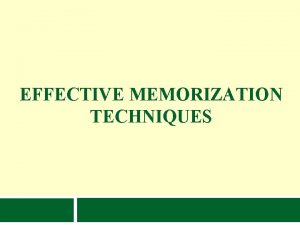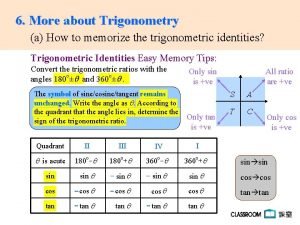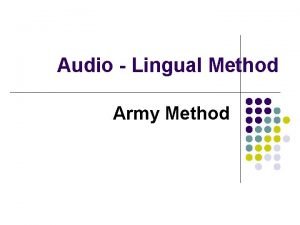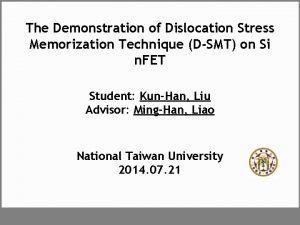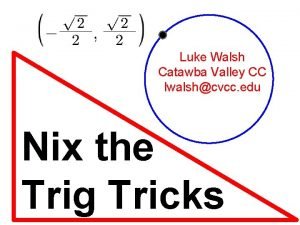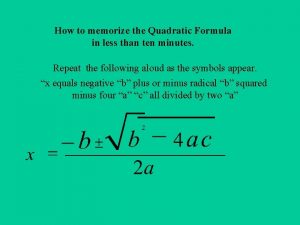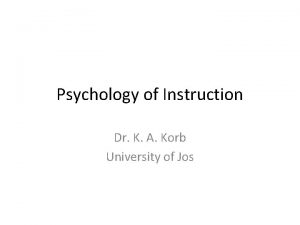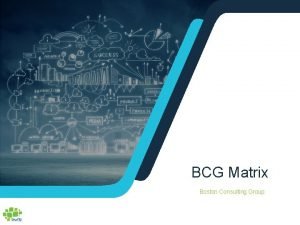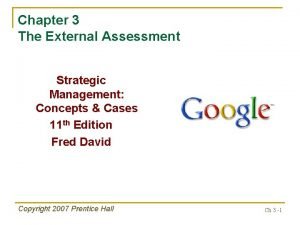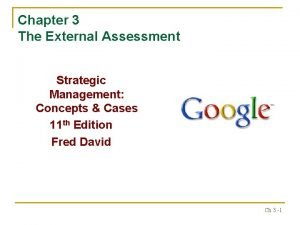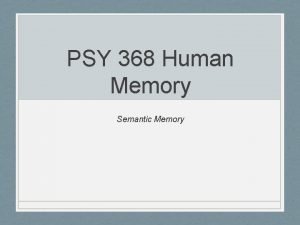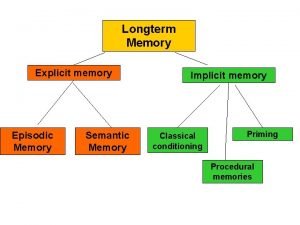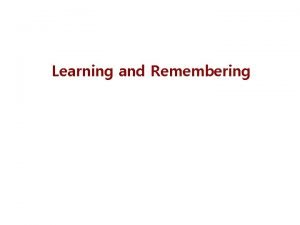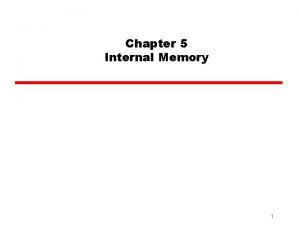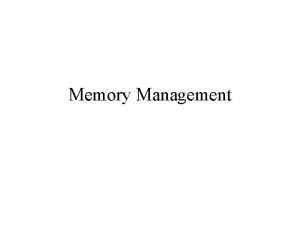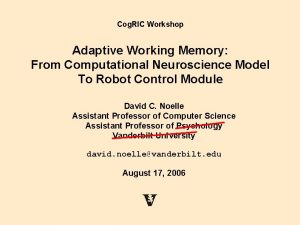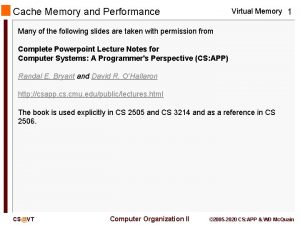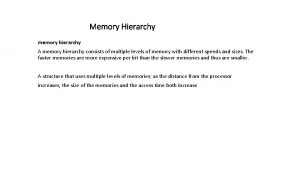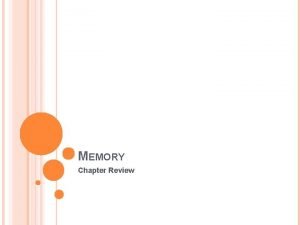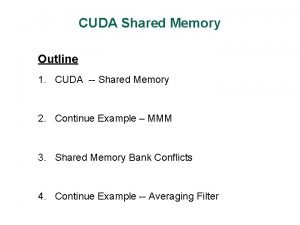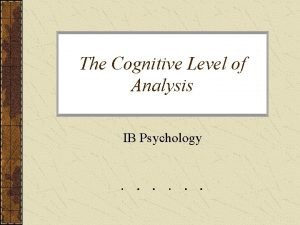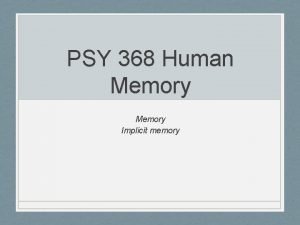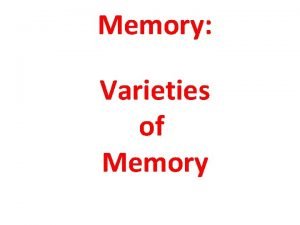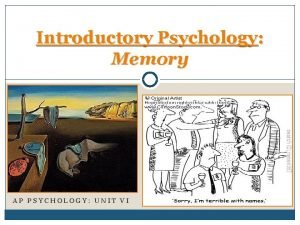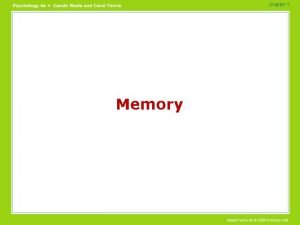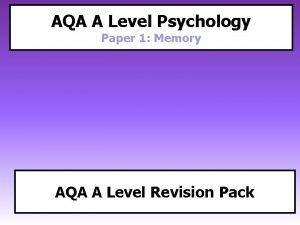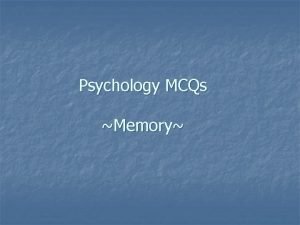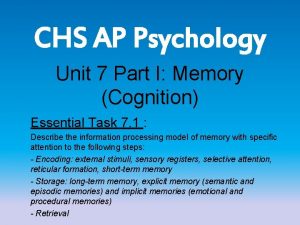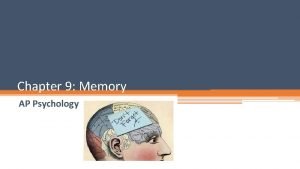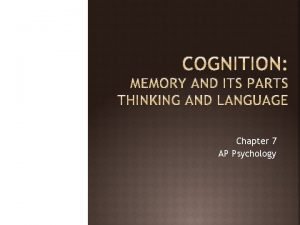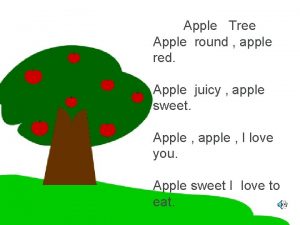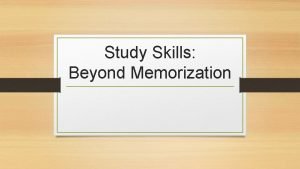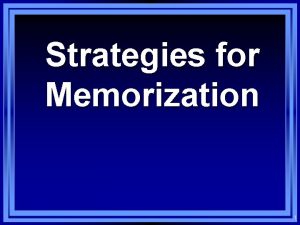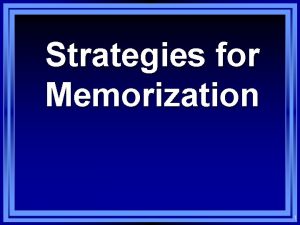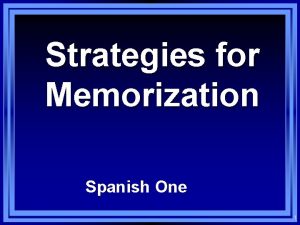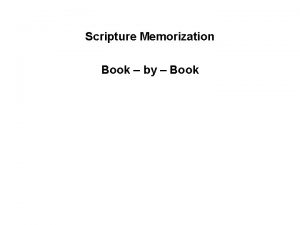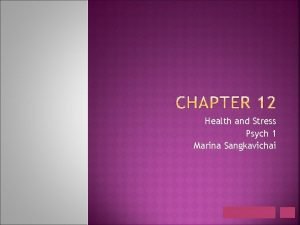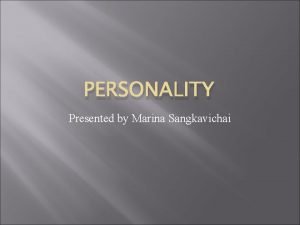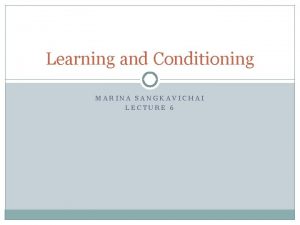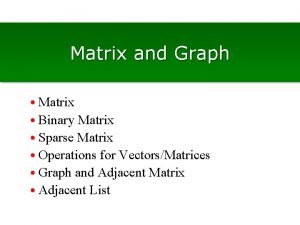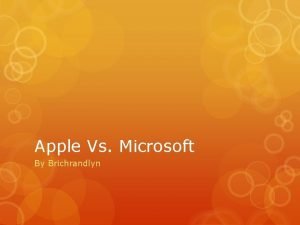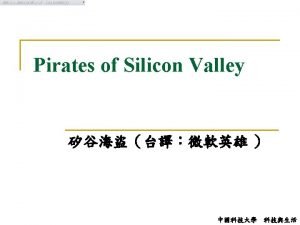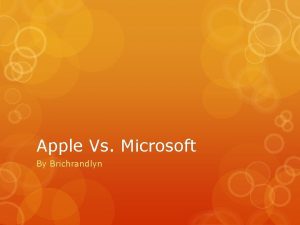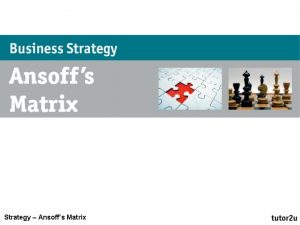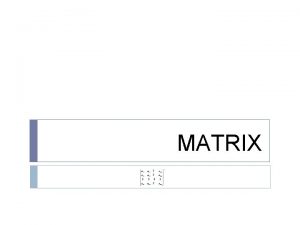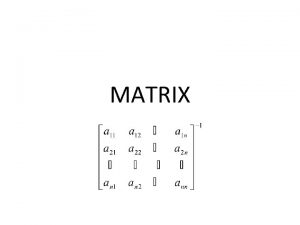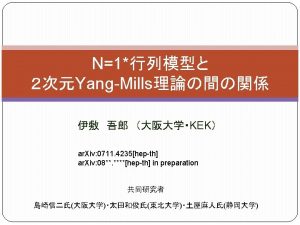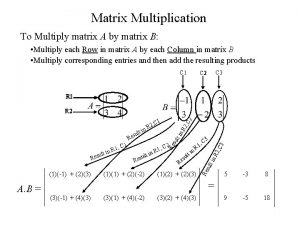MEMORY Psychology 1 Marina Sangkavichai Memorization Matrix Apple



































- Slides: 35

MEMORY Psychology 1 Marina Sangkavichai

Memorization Matrix Apple Elephant Cigar Book Glasses Sleeping bag Shoe Tuxedo Bird boat

Definition of Memory An active system that receives information from the senses, puts that information into a usable form, and organizes it as it stores it away, and then retrieves the information from storage.

Information Processing Model of Memory

Steps to Memory Formation

Hippocampus

What is Memory? Memory helps us recognize faces, names, recall events, speak a language, drive, learn history, our accomplishments, who we are. It is the foundation of us and what makes up our life Citamotua emoceb nac gnissecorp sseltroff. E

Read Effortless processing can become automatic.

Memory is defined as the ability to retain and recall various types and pieces of information. It is measured through the demonstration of “retention” ( what you know ) and the ability to recall. If I ask you what’s your phone number, you can retrieve it. Memory: a mental system for receiving, encoding, storing, organizing, altering , and retrieving information. Researchers have identified specific stages

Steps In Forming Memories Encoding: the processing of information into the memory system-for example by extracting meaning. Like typing in information in a computer. For example, in a picture of people crying over a sad movie and one person is laughing or smiling, what will we encode? Smiling person. Why is this meaningful? If it’s meaningful to you, it’s easier to encode.

Encode This! Are You Going To Remember This?

Steps In Forming Memories Storage: retain the information ( hold it in your mind ) What are some strategies that help you retain it. Retrieval: you are able to get it back out at a later time.

The Memory System Model

Memory Sensory memory: first stage of memory, which holds an exact record of incoming information for a few seconds or less. (fleeting mental image). Like looking at a flower, close your eyes, and see it in your mind.

Memory Echoic memory involves hearing information and holding it in sensory memory as an echo ( a brief continuation of activity in the auditory system ). You can play back in your head what someone just said.

Models of Memory

Short Term Memory Short-term memory the memory system used to hold small amounts of information for relatively brief periods. The rule is up to seven items can be in STM aka working memory. For example storing someones name before a big meeting.

Short Term Memory Short term memory is subject to interruption or interference. For example, if you’re counting pennies and someone interrupts you, you’ll lose your train of thought Or if you’re trying to memorize a phone number or grocery list. View video of Clive Wearing

Psychology Question Explain why some of our memories are inaccurate. What factors can distort ones memory?

Long Term Memory Information that is important or meaningful is transferred to long-term memory (LTM). It is a more permanent storehouse for information. LTM stores what we know about the world Limitless amounts of information. In fact, the more you know, the easier it becomes to add new information to memory. That’s why it’s important to read and increase your knowledge base. BOT EXAMPLE.

Excerpt With hocked gems financing him, our hero bravely defied all scornful laughter. “Your eyes deceive, ” he had said. “An egg, not a table, correctly typifies this unexplored planet. ” Now three sturdy sisters sought proof. Forging along, days became weeks as many doubters spread fearful rumors about the edge. At last from nowhere welcome winged creatures appeared, signifying momentous success. Title of story will help you remember it better….

Excerpt They are a North American group living in the territory between the Canadian Cree, the Yaqui and Tarahumare of Mexico, and the Carib and Arawak of the Antilles…Nacirema culture is characterized by a highly developed market economy which has evolved in a rich natural habitat. While much of the people’s time is devoted to economic pursuits, a large part of the fruits of these labors and a considerable portion of the day are spent in ritual activity. The focus of this activity is the human body, the appearance and health of which loom as a dominant concern in the ethos of the people.

Long Term Memory When you form an image of the Nacirema people, what comes to mind? Do they seem like an advanced civilization or primitive culture?

Excerpt In the preceding description, the Nacirema people may seem undeveloped or backward. In truth, however, the Nacirema people are quite developed. Only the spelling of their name is backwards. AMERICAN. Now if you were to go back and read the excerpt, it would make sense and you will remember it better.

Forgetting Why do we forget? Because we never bothered to encode it in the first place. Someone introduces herself to you and you forget her name. It’s because you never bothered to learn (encode)it in the first place.

Forgetting Memory decay: the fading or weakening of memories assumed to occur when memory traces become weaker. Use it or lose it. I. e. not even recalling events in your own life. Even seemingly LTM can fade. A friend worked for College of the Canyons for five years, knew the number, now doesn’t recall it since he left.

Forgetting Tip of the Tongue ( failure to retrieve): common term for the inability to access retrieval cues aka memory cues. Memory cues are any stimulus associated with a particular memory. Memory cues usually enhance retrieval.

Seven Sins of Memory Blocking-You know it but you can’t recall it (tip of the tongue) Transcience-info that was learned fades over time-memory decay, use it or lose it Bias-attitudes and beliefs about aspects of a situation distort how details are recalled

Sins of Memory Suggestibility-questions and materials presented during an interview influence how the details are recalled ( can lead to memory distortion or creation of false memories ). Example: You say this person crashed into you? Shoved you? Or just bumped into you? Lawyers use this technique

Skill Memory and Fact Memory Procedural memory includes basic conditioned responses and learned actions such as typing, driving, or swinging a golf club. These memories may register in the cerebellum ( part of brain responsible for movement). Declarative memory: stores specific factual information such as names, faces, words, dates and ideas. Expressed as words and symbols. Episodic memory: is an autobiographical record of personal experiences. It stores life events or episodes of your life. First date, graduation, etc.

Flashbulb memories Flashbulb memories: memories created at times of high emotion that seem especially vivid. Where were you on 9/11 Earthquake of 1994 LA RIOTS OF 1992 The Challenger Disaster 1986 These are emotional events in which the limbic system plays a part.

How can we improve memory? Study repeatedly to boost long term recall. Overlearn. Spend more time rehearsing or actively thinking about material. Rehearse and critically reflect! Make the material personally meaningful. Use mnemonic devices. Chunk items Study and then go to sleep. Sleep helps you remember the material better. Increase your knowledge base…link to what you already know. Continue to exercise

Eyewitness Testimony 1. Describe the physical appearance of the attacker or attackers. 2. Did the attackers have a weapon? If so, describe it. 3. Describe the exact sequence of events that took place. 4. Was the incident violent? Was there swearing? 5. How long did the whole incident last?

Memory Mishaps Absent-Mindedness-the mind is too distracted to encode information Transcience-Memories are fleeting, for they decay over time Blocking-Inability to access previously stored information. Tip of the Tongue

Memory Mishaps Memory Distortions Misattribution: confusing the source of information. i. e. believing one had heard a joke from a friend, but having read it from a book in reality Suggestibility: the manifestation of misinformation Bias-A present state, emotional or intellectual, having an altering effect on a past memory. Video: Lost in a shopping mall video ( Loftus )
 How to make apple jelly from apple juice
How to make apple jelly from apple juice Effective memorization techniques
Effective memorization techniques Getting triggy with it
Getting triggy with it Audio lingual method techniques
Audio lingual method techniques Stress memorization technique
Stress memorization technique Unit circle memorization tricks
Unit circle memorization tricks How to remember the quadratic formula
How to remember the quadratic formula Advantages and disadvantages of pedagogical analysis
Advantages and disadvantages of pedagogical analysis Coca cola boston matrix
Coca cola boston matrix External assessment in strategic management
External assessment in strategic management External assessment in strategic management
External assessment in strategic management Semantic prototype
Semantic prototype Difference between implicit and explicit memory
Difference between implicit and explicit memory Long term memory vs short term memory
Long term memory vs short term memory Internal memory and external memory
Internal memory and external memory Primary memory and secondary memory
Primary memory and secondary memory Physical address vs logical address
Physical address vs logical address Which memory is the actual working memory?
Which memory is the actual working memory? Virtual memory
Virtual memory Virtual memory in memory hierarchy consists of
Virtual memory in memory hierarchy consists of Eidetic memory vs iconic memory
Eidetic memory vs iconic memory Shared memory vs distributed memory
Shared memory vs distributed memory Cuda bank conflict
Cuda bank conflict Reconstructive memory definition ib psychology
Reconstructive memory definition ib psychology Implicit memory types
Implicit memory types Examples of explicit memory
Examples of explicit memory Implicit memory psychology example
Implicit memory psychology example A source monitoring error
A source monitoring error Confabulation psychology definition
Confabulation psychology definition Gabbert et al 2003
Gabbert et al 2003 Chunking psychology definition
Chunking psychology definition Mcqs on memory in psychology
Mcqs on memory in psychology Meaning of criminal psychology
Meaning of criminal psychology Ap psychology unit 7
Ap psychology unit 7 Procedural memory ap psychology
Procedural memory ap psychology Serial position effect ap psychology definition
Serial position effect ap psychology definition

